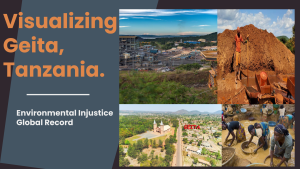Visualizing Geita
xxxx

xxxx

d
The report addresses disaster and health in how it describes actors' emergency response to the initial disaster as adequate but states the aid supplied does not allow progress to occur. The victims of the disaster were given temporary shelter in tents, but many still live in tents at the time of this report being written. These conditions led to a cholera outbreak which the actors did not seem to care about or provide aid for.
“Mrs. Whitman and the agency put out press releases saying that the air near ground zero was relatively safe and that there were "no significant levels" of asbestos dust in the air. They gave a green light for residents to return to their homes near the trade center site”
“By these actions," Judge Batts wrote, Mrs. Whitman "increased, and may have in fact created, the danger" to people living and working near the trade center.”
This group works with American natives and is a Federal agency so its conceptions of disaster and healthcare are politically based. This group's benefits focus on the needs of the native population assessed by information collected through the U.S. Census and other surveys.
One argument presented is that public engagement leads to increased vigilance and emergency preparedness. Nuclear emergency response should not be governed by one elite body of scientists. Information should be crowd sourced from the public to increase awareness and transparency and lead to more ideas as well as public support. Another argument presented is that risk prevention has historically been the focus of governing bodies instead of risk acceptance and emergency response. A nuclear reactor being placed near the ocean is more fiscally responsible but natural disasters are unavoidable, regardless of the amount of risk prevention that has been taken. Instead, the focus should be on emergency response after natural disaster strikes. Safety is also sometimes substituted for profitability.
Artisanal or Snall Scale Mining in Geita.